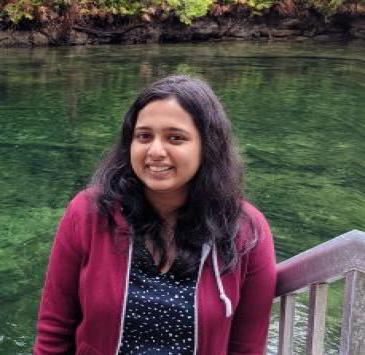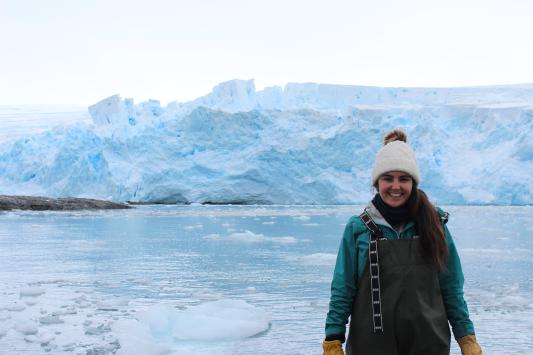Research Cafe: Avanthika Bharath & Jacquelyn Veatch
Event Description
Research Cafe: December 13, 2023
3:00 - 4:00pm
The Hatchery Innovation Studio, Alexander Library
169 College Ave., New Brunswick
Zoom option available.
~Snacks & coffee provided!~
Register to attend in person or on Zoom.
1.) "Bacteria and their superpower to take up environmental DNA: The deep sea edition" by Avanthika Bharath

Abstract: Some bacteria have the extraordinary ability to take up free DNA floating in their surroundings and incorporate it into their own genetic material. This process is called “genetic transformation” and has contributed to bacterial evolution for ages. Although this process is well characterized in clinically relevant bacteria, there is limited knowledge about this process in deep-sea hydrothermal vent bacteria where life is hypothesized to have originated. In this study, we analyzed the genes and proteins of the vent microbiota obtained from basalts, mussels and tubeworm scrapings in the East Pacific Rise, and detected that they do contain and synthesize the machinery necessary for DNA uptake and genetic transformation. Based on this evidence, our major aim was to visually demonstrate DNA uptake in two deep-sea vent species in our lab, Caminibacter mediatlanticus and Sulfurovum riftiae. Actively growing bacteria were exposed to fluorescently labeled DNA fragments for 30 minutes and then visualized using microscopy. We observed fluorescence within the cells for both bacteria, proving that they can take up DNA from their environments. Overall, the findings of this study provide us with preliminary evidence that can serve as a precursor for broadening our understanding of this process in these vastly understudied environments.
Speaker Bio: I am Avanthika Bharath, a 5th year PhD student in Microbial Biology. I work in the Deep-Sea Microbiology lab with Dr. Costantino Vetriani. I completed my bachelor’s in Industrial Biotechnology in India. I moved to the USA and joined Rutgers as a Masters student in 2018 and transitioned to PhD a year later. I am currently studying DNA exchange in deep sea bacteria via a process called “Genetic Transformation”. The most exciting experience during my time in Rutgers was the opportunity to participate in a month-long NSF- Funded research expedition to the East Pacific Rise in December 2022 for a project studying microbial-larval interactions in the deep-sea hydrothermal vents. I had the opportunity to participate as an observer in the Deep Sea Vehicle, Alvin which was involved in deployment, recovery and collection of samples from deep sea hydrothermal vents. I was also a TA for General Microbiology from 2019-2022.
2.) "Finding Food in a Big Ocean" by Jacquelyn Veatch

Abstract: The ocean has been a source of livelihood and inspiration for all of humanity. According to the UN Development Program, 15% of the animal protein we eat comes from seafood, and 80% of all tourism takes place in coastal areas. Yet the coastal ocean is taking a lot of the heat for us, from climate change and pollution. My research works to understand how marine ecosystems concentrate resources at the base of the food web, allowing the creatures higher on the food web to find food. A better understanding of the processes that structure marine food webs will inform effective management, increasing the sustainability of life on this ocean planet. The base of marine food webs is made up of tiny drifting plants and animals called plankton. I hypothesize that the movement of plankton by ocean currents concentrates plankton, creating marine “grocery stores” visited by feeding marine creatures. My research has developed mathematical tools that locate these dynamic marine grocery stores. My research team and I set up an ocean observing system around a known biological hotspot in Palmer Deep, Antarctica. Using a host of instruments, we were able to observe predators forage through fields of plankton and the ocean currents surrounding them. The results of these observations were conclusive: we saw currents push plankton together, forming dynamic grocery stores of prey targeted by predator penguins. This is good evidence that the transport and concentration of food to Palmer Deep sustains the many migratory animals that travel here each year.
Speaker Bio: Jackie is a Ph.D. student in Physical Oceanography with an interest in applying an understanding of maths and physics to the living world. Her dissertation research bridges intellectual gaps between coastal physical oceanography and spatial ecology by investigating how coastal currents transport and concentrate food resources (plankton) into large patches she refers to as "marine grocery stores". Jackie's interest in interdisciplinary work pre-dates her time at Rutgers. She earned her Bachelor of Science in Biophysics from the George Washington University and has tried her hand in immunology, antibody production, coastal ecology, and wilderness adventure before landing in oceanography.
About Research Cafe
Research Café brings together the entire graduate student community of Rutgers University-New Brunswick/Piscataway campus to strengthen scholarly literacy and interdisciplinary research communication by providing a platform for budding researchers to connect, share their in-progress research or scholarship, and benefit from peer feedback in a friendly and low-stakes setting.
Research Café is a monthly, one-hour event to occur at rotating locations across the Rutgers New Brunswick/Piscataway campus (a Zoom option will be available, too). Each event will feature:
- Presentations (10-12 min. each) from two graduate students from across disciplinary areas ranging from engineering and biology to history and anthropology.
- A Q&A dialogue with peers and attendees.
- Conversational time over refreshments and snacks.
Sign up to attend in person or on Zoom at https://grad.rutgers.edu/research-cafe.
---
Questions? Contact the program coordinators:
Sonal Gahlawat at sg1389@scarletmail.rutgers.edu, Briana Bivens at bb770@grad.rutgers.edu, and Ramazan Güngör at rg835@grad.rutgers.edu.